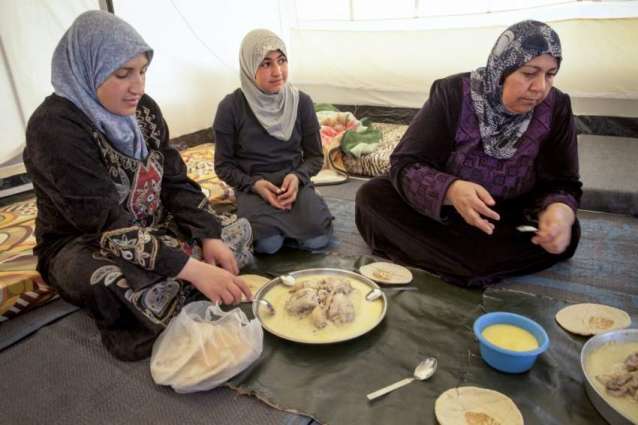The UAE is the top regional contributor and the world’s fifth largest donor to the World Food Programme, with 2019’s contributions amounting to US$270 million, a top WFP official said
ABU DHABI, (Pakistan Point News - 02nd Oct, 2019) The UAE is the top regional contributor and the world’s fifth largest donor to the World Food Programme, with 2019’s contributions amounting to US$270 million, a top WFP official said.
"However, the major contribution of the UAE is hosting the WFP over the past 15 years. The UAE is contributing efficiently to our operations in Yemen, Bangladesh for Rohingya refugees and our school programmes in Cuba," Mageed Yahia, WFP Director for the UAE and Representative to the GCC told the Emirates news Agency, WAM.
"We are proud of this partnership, and working together to move forward to strengthen it," he added.
Yahida made these remarks today following a high-level roundtable discussion convened by the WFP at the Foreign Correspondents Club in Abu Dhabi to look into the link between climate change and food security with special emphasis on the situation in the Horn of Africa.
Erika Joergensen, WFP Regional Director for East Africa, also participated in the roundtable discussion, which was moderated by Jamal Al Suwaidi, the Director-General of Emirates Centre for Strategic Studies and Research.
"WFP entirely depends on voluntary contributions from member states. Today, the UAE ranks fifth after the US, UK, EU and Germany in terms of donations. 2019 witnessed a peak in Emirati contributions to WFP, amounting to US$270 million," Yahia explained.
"We have close ties with many organisations [in the UAE] like the International Humanitarian City in Dubai.
"The roundtable here helped us conduct in-depth analysis of the situation [in the Horn of Africa] and share experience to reach innovative ideas toward lessening the food and nutrition crisis," he added.
The roundtable discussed what innovative solutions could be implemented to tackle climate change, therefore, ensure food security.
"We focused particularly on the situation in the Horn of Africa, which has been hit by consecutive cycles of drought since 2011," Yahia said.
"This year around 7.2 million people in Uganda, Kenya, Ethiopia and Somalia have been affected by drought. It is a major consequence of the lack of food security, with people moving from one location to another desperately in search of food," he continued.
The roundtable provided a wealth of information from diverse partners, Yahia said.
"The participants included representatives from the UAE Ministry of Food Security and International Humanitarian City along with other partners such as the European Union and Dubai Cares.
"It was a very stimulating discussion. Innovative solutions were presented to help populations build resilience in times like this," he emphasised.
The WFP top official labeled the situation in Yemen as the most complex his organisation has even been involved in, however, progress is being achieved, he said.
"Yemen is one of the most complicated situations WFP has been involved in, as we are mainly working in conflict zones and disaster-hit areas. Operations there are the most complex. The magnitude of people’s needs is huge. However, we have managed to reach out to 12 million people so far thanks to the contributions of world donors, among which UAE features high."
Underlining the importance of ensuring concerted actions to overcome challenges, Yahia said, "The challenges we are facing regarding food security, climate change and conflicts are huge, so we can’t work without partners. We have to strengthen the partnerships we have and build new partnerships to be able to move forward."
Erika Joergensen, WFP Regional Director for East Africa also talked about food security and climate change, telling WAM, "There is no stability in the world without food security."
"We need to join hands. Private sector, institutions, academia, UN, humanitarian organisations and also the governments need to join hands to bring in sustainable solutions to food security challenges," she added, hailing UAE's response to WFP operations.
"It is my first visit here and I see a very positive interest from the UAE in strengthening the WFP efforts as well as willingness to share technologies and expertise. I think we can benefit from this.
"As UN Secretary-General put it before: it needs determination from politicians, decision makers and influencers; from people who can actually make a difference, to help people survive drought conditions. In the Horn of Africa, an estimated 13.7 million people in Ethiopia, Somalia, Kenya and Uganda are facing food crisis," Erica added.
Discussions during the roundtable highlighted the need to avert a major regional food and nutrition crisis.
WFP representatives expressed concern over the likely delayed start of October-December short rainy season in Kenya, Somalia and Ethiopia, which will lengthen the period of dry harsh conditions in previously drought affected areas, and as a result aggravating the negative impact on food security.
According to an official document released by the WFP during the roundtable, a total of US$270.2 million is urgently needed to to help 4.6 million people in the four countries.




